As an Amazon Associate I earn from qualifying purchases. See my disclosure policy.
Making your own candied orange peel and candied lemon peel is super easy and the difference between homemade and store-bought is absolutely mind-blowing! Leave the store-bought stuff on the shelf because nothing, and I mean NOTHING compares to homemade! Use this method to make any kind of candied citrus peel.

How To Make Candied Orange Peel
If you’ve never made your own candied orange peel get ready to be absolutely dazzled!
Today we’re going to make delicious use of a portion of the citrus fruit you may normally discard by making candied citrus peels. Think of these delightful sweet treats like citrus flavor on steroids!
While candied orange and candied lemon are the the most commonly used, candied grapefruit and lime also have a delicious place in the mix and I’m going to demonstrate the process using those as well.
There are a few reasons you should make your own candied peel: 1) The store-bought stuff is generally not organic and citrus fruits are highly sprayed with pesticides and fungicides. 2) It’s made with a lot of chemicals. 3) It’s not fresh. 4) Most of it tastes bad. Like really bad. I regularly have readers request recommendations for good brands of candied citrus and the best recommendation that I can offer is to make your own! Because once you do and taste the difference, you’ll never buy it again.

The good news is, it is SO easy to make your own! And it keeps for a long time, especially if you freeze it. The flavor is 100% better than store-bought and will bring your baked goods to life.
How to Use Candied Orange Peel
And this applies to all varieties of candied citrus peel. Here are a few ideas:
- As garnish for pies, cakes and cupcakes
- Chopped up and added to cookies, cakes, muffins, cupcakes, scones, etc.
- Sprinkled over ice cream or yogurt
- As garnish for citrus-flavored drinks
- Finely chopped and added to streusel topping for muffins and cakes
- Dipped in chocolate for an elegant sweet treat (dip candied orange peels in chocolate to make orangettes, a classic French confection)
- and whatever else your imagination can think of!

Candied Orange Peel Recipe
*NOTE: The process is the same for making any kind of candied citrus peel.
Let’s get started!
Select the best citrus fruits possible and give them a thorough scrubbing and washing. We’re not sticklers about buying all of our produce organic, but we do stick to organic for certain items that are highly sprayed and/or waxed. And in the case of citrus fruits, if I’m using the peels for zesting or candying, I use and recommend organic.
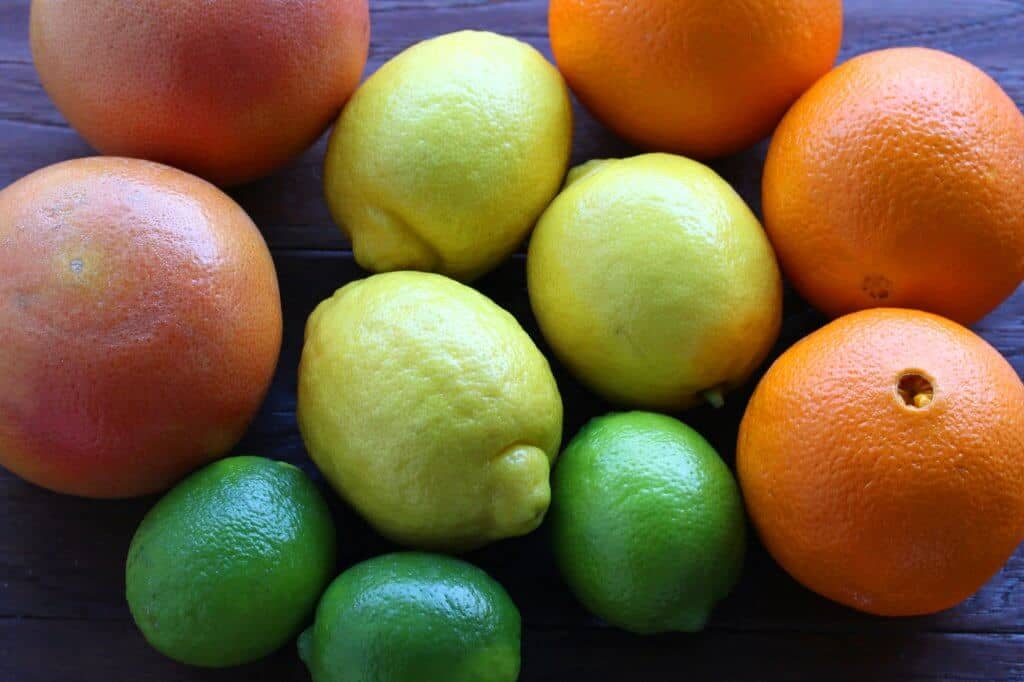
Slice both ends of the orange. Cut the peel on each each into 4 or more vertical segments, depending on the size of the fruit. Peel off each segment of rind.
Note: You can remove a some of the white pith, though not necessary. The white pith has a bitter flavor, so keep that in mind, but also keep in mind that the thinner your peels the harder/more leathery they will be. The purpose for blanching the peels (boiling in water and discarding the water) is to eliminate some of the bitterness. If leaving the pith on you can repeat the blanching procedure 2 or 3 times to reduce the bitterness.

The process is the same for any citrus fruit. Candied grapefruit peel, candied lemon peel, candied lime peel, candied mandarin or clementine peel…they’re all delicious!

Slice the peels into 1/4 inch wide strips.
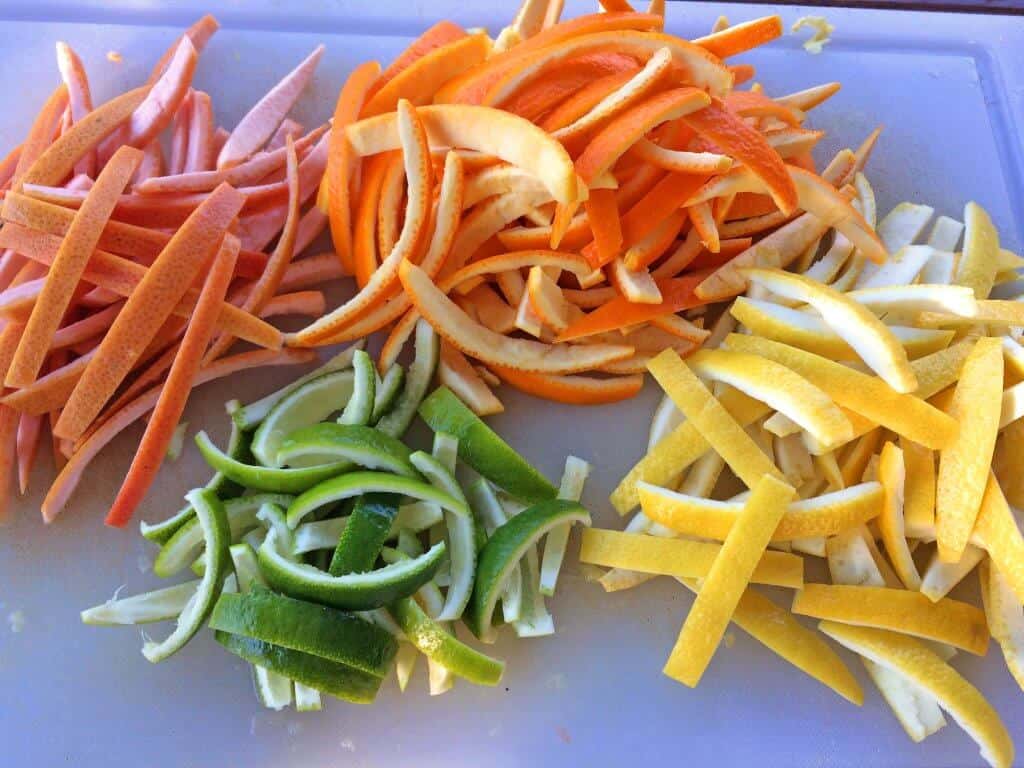
Keep the peeled citrus for eating, cooking or juicing.
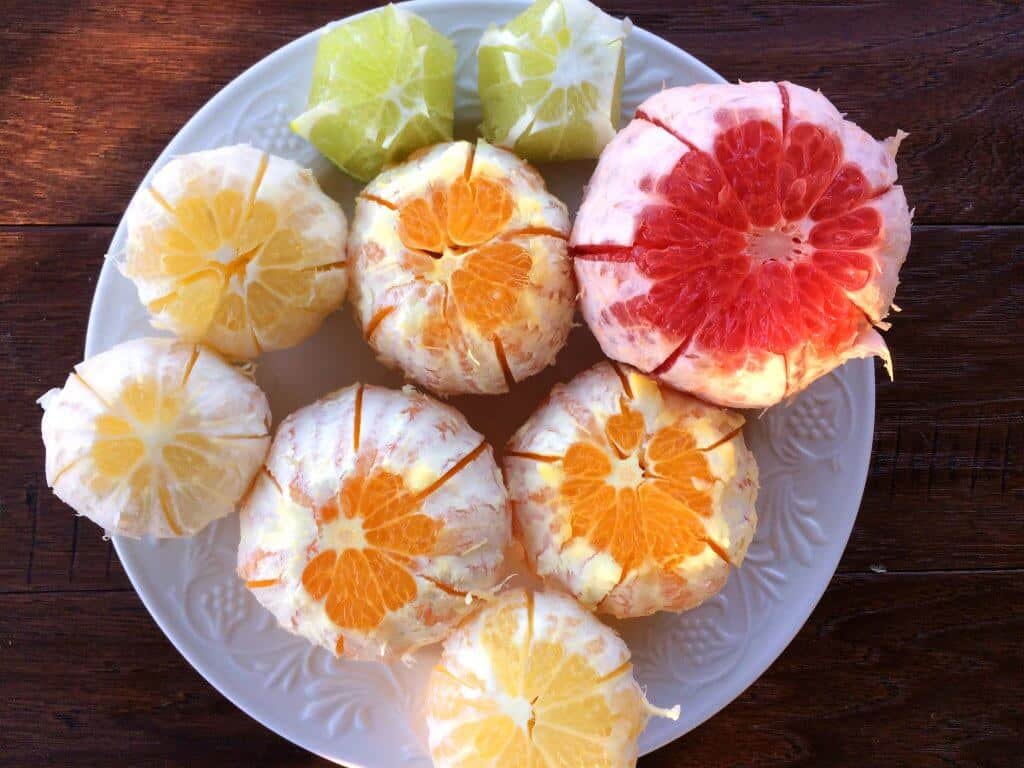
Boil the peels in water in a pot for 15 minutes. Drain the peels in a colander, rinse and then drain again. Discard the water from the pot.
**Note: To further reduce the bitter flavor repeat this step.
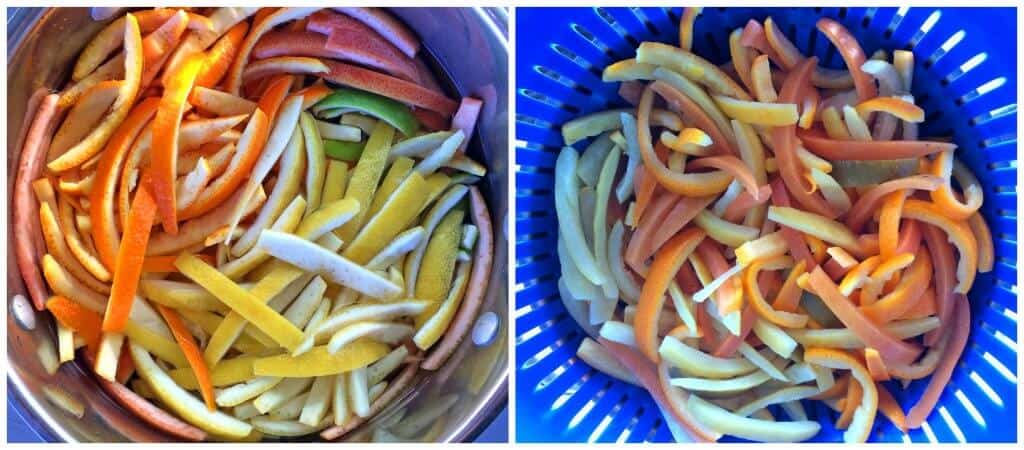
Add the sugar and fresh water to the pot and bring it to a boil. Boil it for a couple of minutes until the sugar is dissolved.
Add the citrus peels, reduce the heat and simmer for about 45-60 minutes, stirring occasionally, until the peels become translucent and the liquid becomes lightly syrupy.
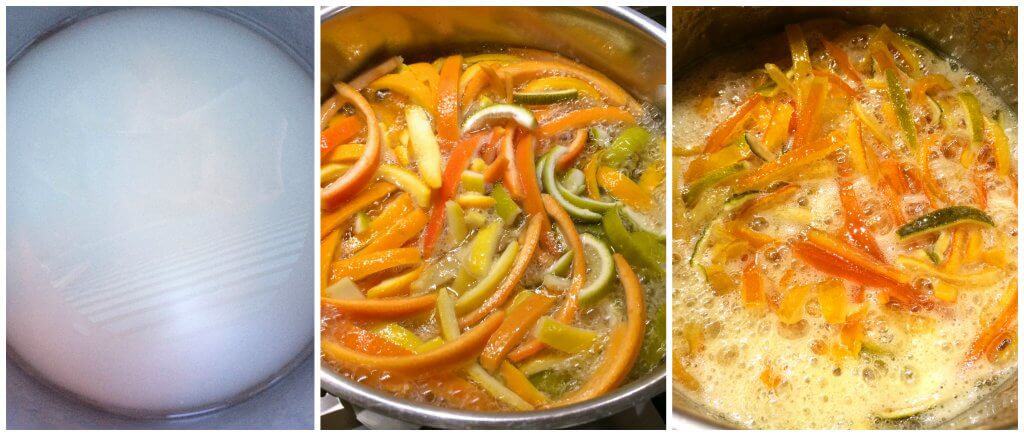
Use a slotted spoon to remove a few of the peels at a time and let the excess syrup drip off for a few seconds. Place the hot, wet peels in the bowl of sugar and toss to coat. If you’re making a large batch it’s easiest to place the sugar in a ziplock bag and shake the peels in it.
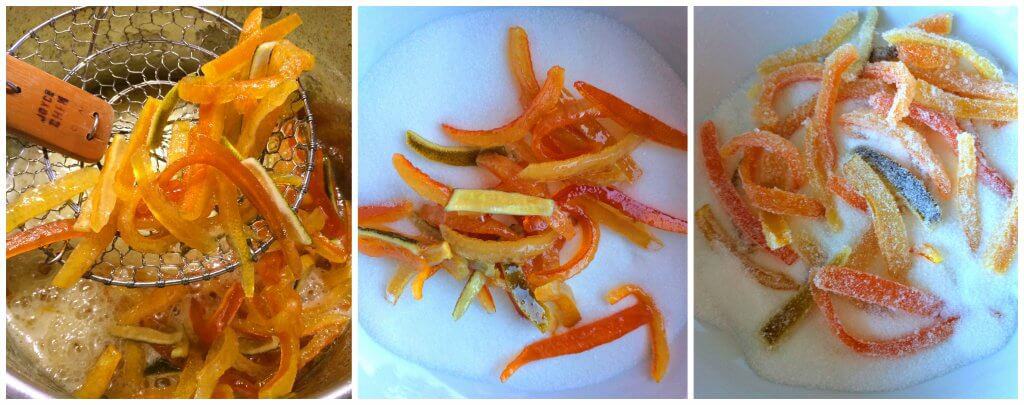
Spread the candied citrus peels out on a wire rack to cool and dry completely, 1-2 days.
Stored in an airtight container in a cool, dry place, the candied citrus peel will keep for at least a month. They’ll keep even longer in the fridge and for a few months frozen. (I usually keep them in a ziplock bag in the freezer and then conveniently grab whatever I need.)
Note: If you find your candied citrus peel gets hard after a while don’t worry – they will soften up beautifully as they bake in whatever recipe you add them to!
Note: To keep the candied peels even softer you can limit the drying time, skip the final sugar coating step and put the peels in a ziplock bag and either refrigerate or freeze them.

Finally, DON’T DISCARD THE CITRUS SYRUP!
This is a wonderful citrus-flavored simple syrup to add to your drinks for a wonderful kick of citrus flavor!
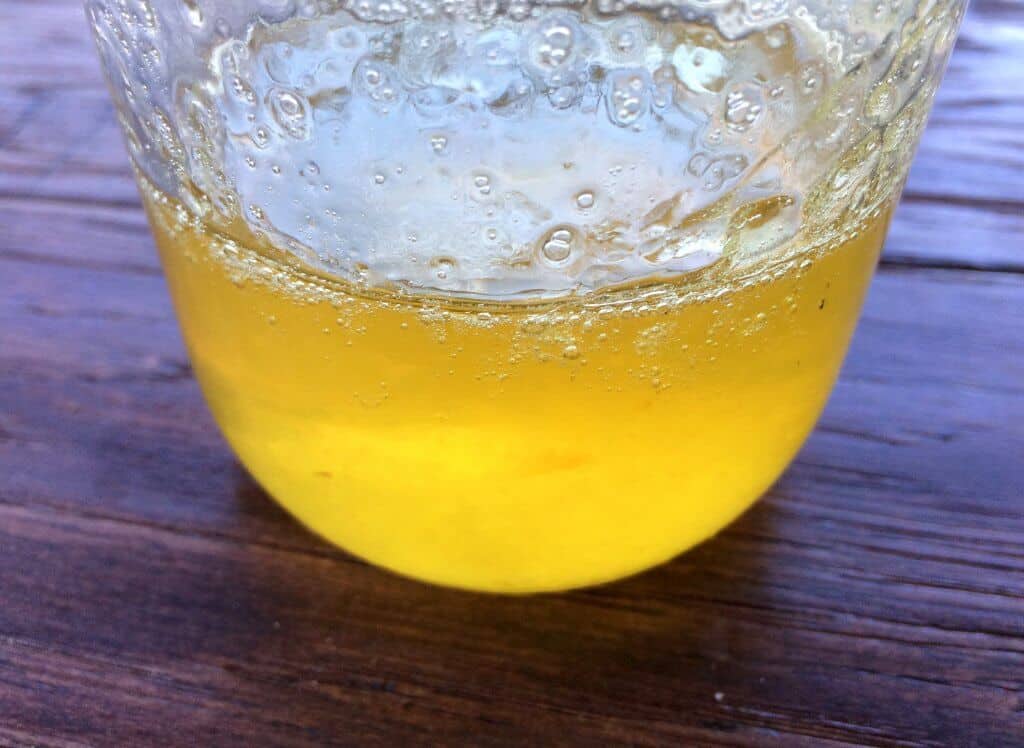
Enjoy!

Use your homemade candied orange peel in some of our favorite recipes:
Be sure to also try our homemade Candied Ginger!
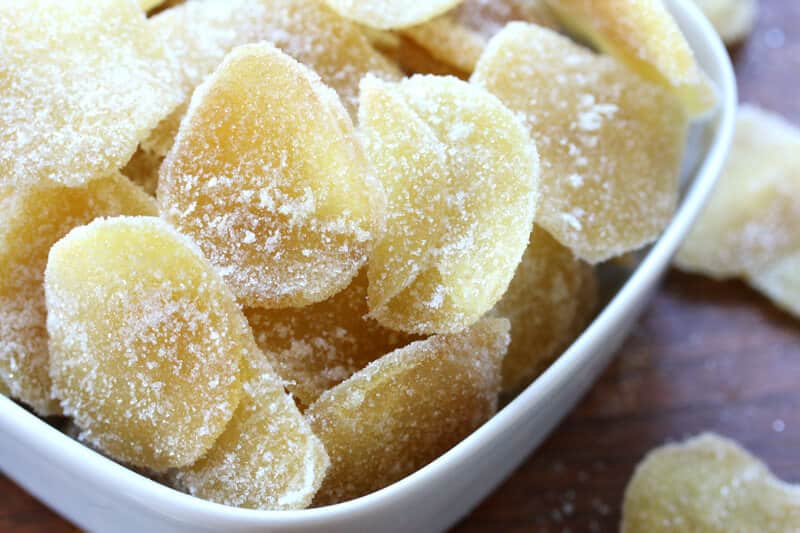

Candied Orange Peel
Candied citrus peel is easy to make yourself, contains no chemicals or additives, and tastes MUCH better than store-bought!
Ingredients
- 3 Valencia or Navel oranges and 4 lemons (can also use the equivalent of grapefruits, Meyer lemons and limes, or any citrus of your choice, thoroughly washed and scrubbed (as citrus is highly sprayed, I recommend using organic)
- 2 cups sugar
- 1 cup water
- Fine granulated sugar for coating
Instructions
-
Slice both ends of the citrus fruits. Cut the peel on each each into 4 or more vertical segments, depending on the size of the fruit. Peel off each segment of rind. (You can remove a little of the white pith, though not necessary. The pith is bitter but the blanching process below will help reduce the bitterness. Note that if you remove the white pith, the thinner the peels are the harder and more leathery they will be when they’re candied.) Slice the peels into 1/4 inch wide strips. (Keep the peeled citrus for eating, cooking, juicing, etc)
-
Boil the peels in a pot of water for 15 minutes. Drain the peels in a colander, rinse and then drain again. Discard the water from the pot.Repeat this process one or two more times to reduce the bitter flavor.
-
Add the 1 cup of fresh water and the sugar to the pot and bring it to a boil. Boil it for a couple of minutes until the sugar is dissolved. Add the citrus peels, reduce the heat to low and simmer for 45-60 minutes, stirring occasionally, until the peels become translucent and the syrup becomes lightly syrupy (on a candy thermometer this will be be approximately soft ball stage).
-
Use a slotted spoon to remove a few of the peels at a time and let the excess syrup drip off for a few seconds. Place the hot, wet peels in a bowl of sugar or a ziplock bag with sugar in it and toss/shake to coat.
-
Spread the candied citrus peels out on a wire rack to cool and dry completely, 1-2 days.
-
Stored in an airtight container in a cool, dry place, the candied citrus peel will keep for at least a month. They’ll keep even longer in the fridge and for a few months frozen.Note: If you find your candied citrus peel gets hard after a while don’t worry – they will soften up beautifully as they bake in whatever recipe you add them to!Note: To keep the candied peels even softer you can limit the drying time, skip the final sugar coating step and put the peels in a ziplock bag and either refrigerate or freeze them.Yields approximately 8 ounces of candied citrus peel depending on peel thickness.
Notes
*If you’d like to make more candied citrus peel, simply increase the amount of water and sugar by the same 1:2 ratio.
***
***NUTRITION INFO BELOW IS FOR THE ENTIRE BATCH (NOT PER SERVING)
Nutrition
Calories: 1641kcal | Carbohydrates: 430g | Protein: 3g | Sodium: 22mg | Potassium: 447mg | Fiber: 9g | Sugar: 407g | Vitamin A: 70IU | Vitamin C: 171.8mg | Calcium: 84mg | Iron: 2.1mg
Originally published on The Daring Gourmet January 9, 2017





More Stories
Enrichment Time – Joy the Baker
Better Than Classic Pound Cake
Extra Easy Coconut Rice